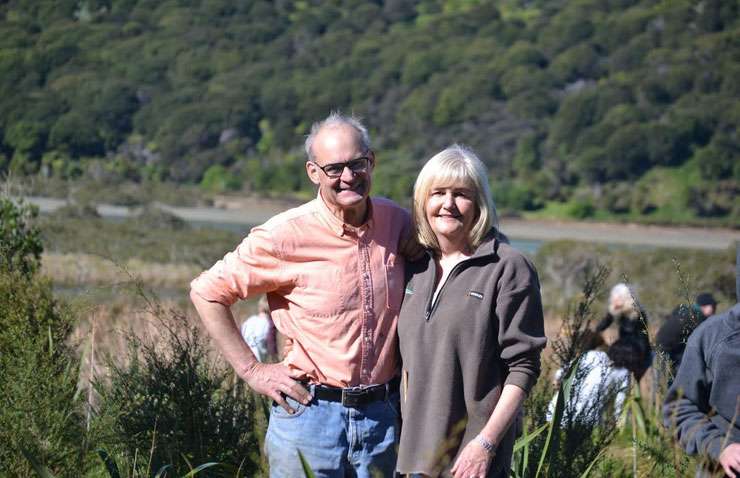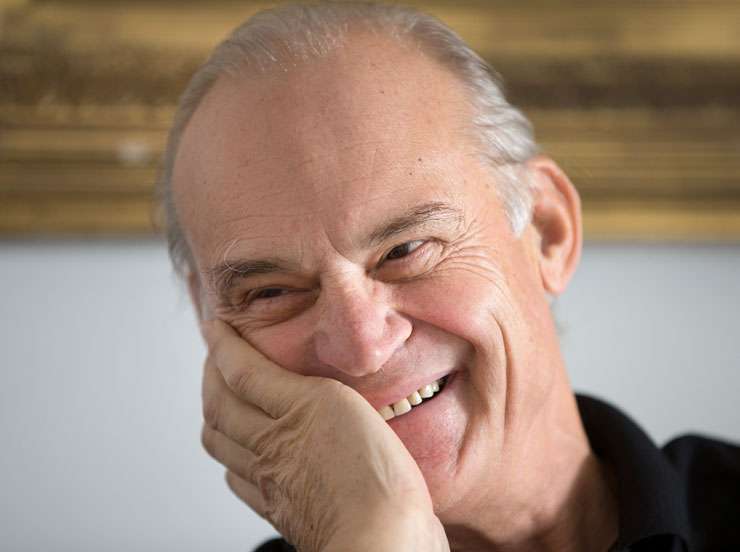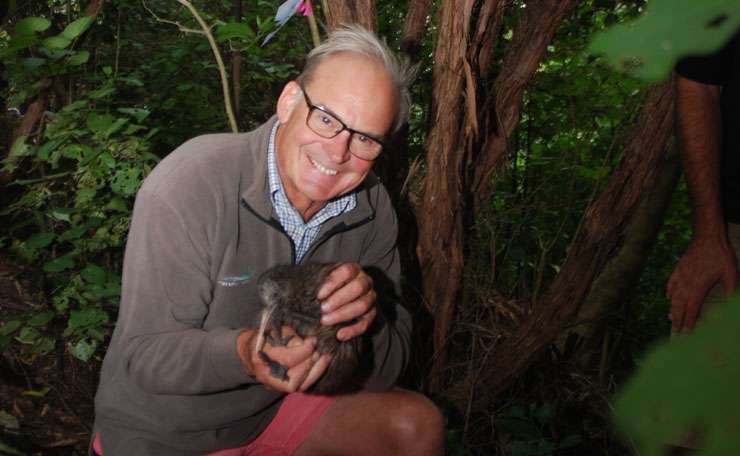The widow of celebrated environmentalist Sir Rob Fenwick is putting 164 hectares of the couple’s beloved Waiheke Island estate up for sale.
Lady Jennie Fenwick said that before Sir Rob died last year, aged 68 after a five-year fight against cancer, they had talked about selling part of their holding at Te Makutu Peninsula.
But unlike other real estate transactions, the land might not go to the highest bidder, with the conservation values of the purchaser to be a key factor in the sale.
In an interview with OneRoof, Lady Jennie said she was no longer able to manage the land on her own.
Start your property search
She said she was looking for a buyer who could cherish the land as much as Sir Rob did and who could carry on his fight against pests.
The land meant everything to Sir Rob, she said, and she still remembers the message on the answerphone 35 years ago in which he told her he had bought something special on Waiheke.

Sir Rob and Lady Jennie on Waiheke. Photo / Supplied
She was about three weeks away from giving birth, and Sir Rob had attended a mortgagee sale for a farm on the island. “Sorry darling, I’ve bought a farm,” he said in the message.
Lady Jennie said: “Having this love affair for the land really was where the seeds for his huge and ambitious schemes came from – it started on this land and then we tried to get the whole of New Zealand to join in.”
Prior to buying the land, a farm in three titles, she and Sir Rob owned a small piece of land next door where they used to camp but with no road access they got there by boat.
Lady Jennie said: “We used to leave from Maretai. We had a Great Dane, a Labrador and a German Shepherd between us and then the first baby came and she was three months old when we found out there was another one on the way, so I’d have a baby in a front pack and the three dogs and Rob, and Rob’s oldest daughter often.”

Environmental crusader Sir Rob Fenwick died last year after a five-year fight against cancer. Photo / Brett Phibbs
Lady Jennie said that a mining company had wanted to purchase the farm for the manganese and chip that run through the peninsula.
“By weird coincidence that company had been purchased by a larger company the week of the auction and they had banned all capital purchases until a restructure had been done so the mining company that was there intending to buy was hamstrung by that - and Rob bought it.”
The peninsula had “rampaging” wild cattle in the bush, rats, feral goats, pigs and forest with no understory, and paddocks in disarray full of ragwort and gorse.
Sir Rob, who was founder of the Living Earth composting business and the driving force behind the Predator Free 2050 movement, set about putting everything right as fast as he could, Lady Jennie said, but getting the stock out of the forest took a lot longer than planned – “the last pigs are just coming out now".
The couple went on to buy a derelict oyster farm in Te Makutu Bay, now thriving as Te Matuku Oysters – which is not part of the sale.
Now, the land has beautiful native forest, hardly any rats and many bird species which have not been seen there for probably 80 years.

Sir Rob with a kiwi that was named after him. He dedicated his life to eradicating pests that endangered New Zealand’s native wildlife. Photo / Supplied
“We’ve got weka, pateke, banded rails, kaka, kakariki, and we have spotted and we’ve heard and seen the New Zealand falcon, and we’ve got all the wading birds now in such a big, beautiful estuary,” Lady Jennie said.
While there are no Kiwi there yet, having them released there remained a dream, she said.
The property is yet to go to market and the method of sale has not been finalised yet, but the part of the farm which will be for sale runs from the shoreline of Te Matuku Bay.
“It’s a very protected area and it runs up to the ridge of Te Matuku Peninsula. About 60 hectares of that is already strictly covenanted under a Reserves Act covenant,” Lady Jennie said.
That covenant would take an act of Parliament to break and the land can’t be subdivided, she said.
While developers aren’t welcome, there is a magnificent building site there for someone’s dream home with views of the entire bay, across the islands of the Gulf and back the other way deep into the mangrove wetlands.
“Really, the responsibilities that lie with that land are just the continuation of 35 years of predator control, which I’m happy to keep doing as long as people don’t mind me wandering around in the forest,” Lady Jennie said.
The property will attract the right owner, she said. “There are some people who will match our values and be very interesting in extending the conservation work we do.”









































































